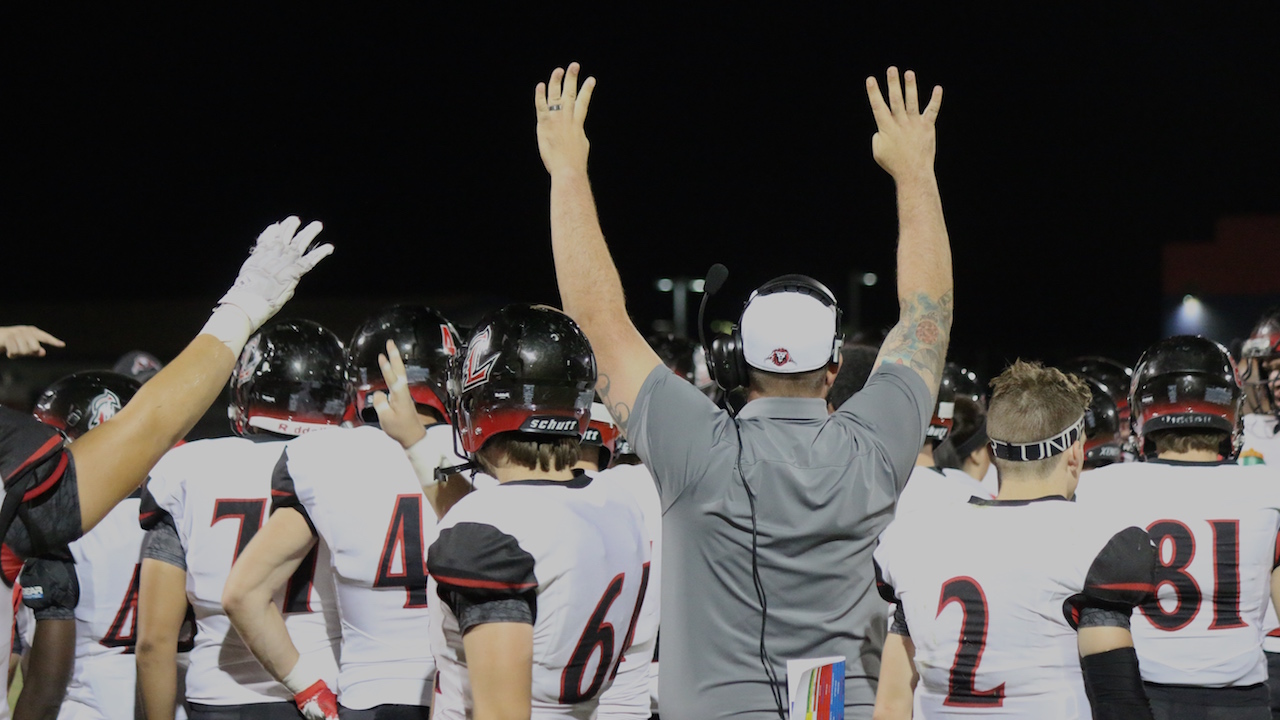By: Max Madden
GLENDALE – There are no trades, no free-agent acquisitions and no draft of talented prospects. A coach is given a handful of 14 to 18-year olds and a simple, often insurmountable task: cultivate enough young talent to remain competitive against programs twice your size.
This is a struggle Ironwood High School is all too familiar with. The Eagles have yet to reach the playoffs during the past four seasons and their most recent postseason victory was over a decade ago.
The Eagles compete in the 5A division of high school football in Arizona – the second-highest level the state. The divisions are in place in an attempt to even the playing field when it comes to available talent, but basing designations solely on enrollment numbers is a strategy that has proven to have major flaws, especially in a state that practices open-enrollment.
Ironwood’s baccalaureate program attracts an additional 500 students to the school, but none of them can be found on the football roster. As head coach Ian Curtis explains, the Falcons are in a difficult situation.
“We’re a school of about 2,000 students, but when you take into account the number of students that are here just for the IB program, we’re really a school of about 1300,” Curtis said. “It’s a detriment. We’re not a school that legitimately has 2100 or 2200 students to pull athletes from. It does put us in a rougher spot.”
Curtis admits that he understands the many beneficial aspects of letting students choose the high schools they attend, but worries that the legislation is not being used as it was intended to.
“Open enrollment is all about academics,” Curtis said. “But to a large degree, open enrollment is not being used for academics. A lot of kids are utilizing open enrollment to go to schools with strong sports programs.”
He’s right.
For years, high school football coaches across the valley have engaged in pseudo-recruiting tactics to lure prospective high school athletes away from schools they’re on track to enroll in, all in an attempt to secure junior high talent for their varsity programs.
A practice once reserved for multi-million dollar collegiate athletic programs has snuck its way into the high school level, largely due to the rampant exploitation of open-enrollment.
The coaches roam Pop-Warner youth football programs, swooning parents, evaluating seventh and eighth graders’ athletic potential and encouraging the 12-to-14 year olds to commit to their program.
“I was shocked, the number of coaches that I know at other schools that were consistently at these parks and fields on Saturday’s,” Curtis said of his experience coaching his son’s youth football team. “Just walking the sidelines, glad-handing, talking to parents and encouraging them to send their kids to their school.”
This kind of backdoor recruiting is a strategy that is technically available to every coach in the state, but a fair number of them refuse to do it for a variety of reasons.
To Curtis, it’s a matter of ethics. To William Babb, though, staying away from this roster-building technique has special reasoning behind it.
Babb grew up in the west valley, attended the schools within it and went on to become the head coach at Peoria High School. He fears that young players leaving their expected schools for others creates a rift in the communal aspect of local schools’ athletic programs.
“The thing that I want for our kids is to have a high school representative of our community,” Babb said. “It’s a sad day in sports when kids live in an area of a school and you can’t even make your high school team because there are so many kids from outside of the community taking up those spots.”
Both Babb and Curtis have honorable intentions engrained in their coaching philosophies, but taking the morally sound approach has its consequences.
Instead of purusing youth programs every weekend, Curtis roams around his own campus to find kids that haven’t yet tried out for football and visits his feeder schools often in an attempt to keep students on track for Ironwood.
“It’s just a sad reality of the times,” Curtis said. “We’re trying to make contact with these young men to encourage them to attend Ironwood so they don’t just think ‘Oh, Ironwood hasn’t been to the playoffs in a few years I’m not going to go there.’”
Finding enough young talent to create a competitor is one issue, but fielding enough players to even have productive training sessions is another.
“We’re pretty small, not everybody wants to play football,” Babb said. “On Friday night, you can only play 11 at a time, but it helps during the week. It’s tough to practice when you don’t have enough guys.”
Struggling to find promising student-athletes on your own campus, barely collecting enough able-bodies for an effective practice and desperately visiting feeder schools in an attempt to preserve an already-depleted talent pool all result from schools taking advantage of open-enrollment legislation.
Luring top-tier talent away from other programs is a trend that shows no signs of fading away, either, for a simple reason: it works.
There are plenty of programs regaining top-tier talent year after year and manufacturing sustained dominance at the highest level. Hamilton has been to 12 of the last 15 6A state championships, Chaparral four of the last seven at the 5A level and Saguaro seven of the last ten in 4A. All of these schools have utilized the states’ open-enrollment laws to garner transfer students and recruit outside of their geographic zones.
As the concept of parity seemingly transitions into a thing of the past, it’s clear the state of high school football in Arizona isn’t headed in the right direction. When asked about his thoughts on the projected competitive atmosphere within the sport, Curtis offered a concerned outlook:
“When you can hand pick in pretty much any division those five schools that have a chance to win the state championship out of 35 or 40, I would say that that’s not a healthy environment.”



